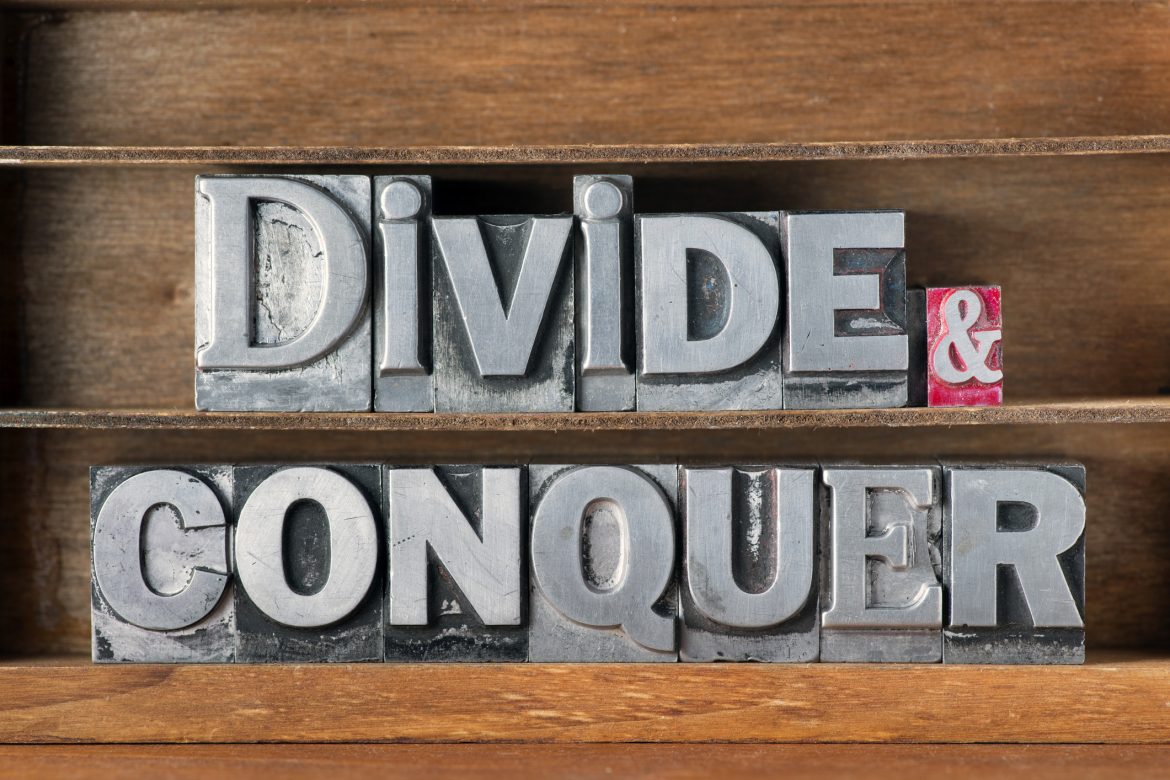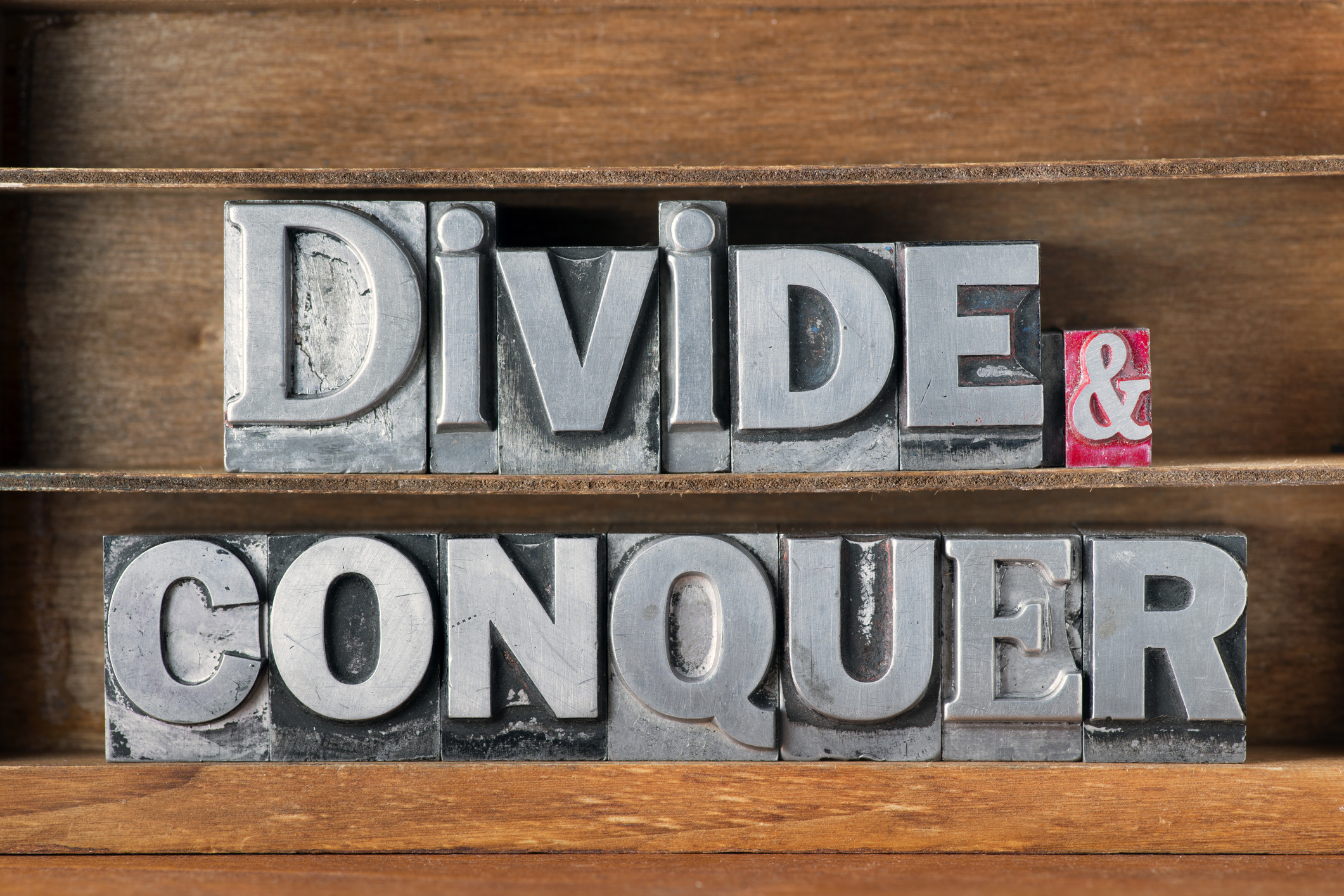
“Divide and conquer,” is a frequently used term and almost as frequently misused when unity is what you’re really after. In this Tough Things First podcast, Ray Zinn talks about how a winning team in business or on the playing field is one that focuses on what unites, not what divides.
Rob Artigo: I’m Rob Artigo, your guest host for this edition of the Tough Things First podcast where I get a chance to talk with Ray Zinn, as noted, the longest serving CEO in Silicon Valley. And that’s for good reason. He’s been there, he’s done that. Hi Ray. It’s good to be back.
Ray Zinn: Hi, Rob. Yeah, thanks. Making me blush here buddy.
Rob Artigo: Well, good. Divide and conquer. I was kind of looking at the history of this, and this is the tactic Julius Caesar used 22 centuries ago, but he wasn’t the first person to do it. So divide your enemies up and conquer them. And in modern times we’ve gotten to this notion of divide and conquer meaning I have to take my team and divide my team up into smaller groups and then I can conquer. You’re saying that that is not helpful logic?
Ray Zinn: Well, that’s going back to the silos.
Ray Zinn cont: If there’s an entrepreneurial term referring to organizations that developed these silos, that’s dividing. In other words you develop a… You protect your organization against the other organizations. And I know I talked to recently a person who was being… Their company was going through some restructuring and so the teams that were left, they’re fighting over them because you’re trying to keep as much of your capabilities as you can, elevate yourself in your organization. So now they’re fighting over who gets what part of what’s left over in the organization. And so there’s a lot of dividing and conquering going on in that aspect.
The military or in the rules of war, there is that divide and conquering mentality because if you can cause a division, then you can conquer them and we talk about in our society today, we’re talking about when we’re divisive, it means we’re divided, if you’re divisive. In society we’re talking about this aspect of being divisive. In society we don’t want to be divisive, we don’t want to be divided. There is no way to conquer when you’re divided in society. And so if you want to conquer, the way you conquer is by uniting. Again, so this is a societal thing. We’re not talking about war here. We’re talking about trying to have peace, P-E-A-C-E. And so in peace, that’s what you want to conquer. You want to conquer peace. So to conquer peace means you can’t be divisive or divided.
Rob Artigo: Yeah, I guess the other words you can use instead of conquer would be to win, to succeed, to improve the lives of others.
Ray Zinn: Overcome. Conquer means to overcome.
Rob Artigo: Yeah, to overcome. So overcome a problem. To overcome a problem if you want to do that. One of the things you wrote recently to me was that you said you got to focus on what unites us, not what divides us. And somewhere in there there’s a solution that has some common ground and you can’t just say, you have to take it. It’s my way or the highway, do it exactly the way I want it, and any deviation from that would be affront to me. But we can’t operate that way because there has to be some common ground to find a solution.
Ray Zinn: Well, that’s what we’re talking about what unites us is how we conquer. So if you’re going in for a job interview and you want to conquer that job or to win it as you would, then you have to be united with your interviewer if you want the job. So you try to find ways where there’s common ground, where there is some commonality in the way that interview is going. You don’t want to be divisive. Can you imagine going into an interview for an important job and you’re divisive? Do you think you’re going to get that job? I don’t think so. So again, just use the common logic of if you want to conquer, if you want to win, you have to unite, you have to have commonality, you have to have some kind of unification of that relationship, whether it be your spouse, whether it be your children, whether it be your neighbor or whatever.
If you want peace, P-E-A-C-E, if you want peace, you have to find a way to have common ground, commonality. We all have a commonality, but we don’t often look for it. We look more for what divides us as opposed to what unites us. And so if you start out, whether it be an interview for a job or whether it be in a relationship with another person, a friend or family or whatever, you want to find out what unites us. And the word that unites us is the word yes, Y-E-S. And so you try to find out where there’s a lot of yes. Yes, yes, yes. And so that’s what brings us together as opposed to divides us. I know that in… Recently, I was talking to one of my family and they were talking about the Philadelphia Eagles, and evidently some friends had gone to a… They were 49er fans and had gone to the Eagles game and the Eagles fans they were terrible.
They were not nice at all. Football is a contentious game and there’s people trying to hurt each other and whatever, but they didn’t treat their compatriots well, the people who were rooting for the other team, all that badmouthing and foul language and throwing stuff at them and just mistreating them. See, that’s what happens when you have a competition… Competition should be uniting, not just dividing. And I know the teams, you’re divided into two teams, but you can still be united in the way you treat each other. Good sportsmanship unites, right? You have to be a good sport. Even if you’re playing in a highly contentious game, whether it be tennis, hockey, basketball, football, baseball, whatever, you still have to be united in the common goal of sportsmanship. And so that’s the key to this podcast is we got to become good sports and we can have our differences, but we don’t have to be different. Okay. We can be united in the way that we relate to each other and be good sports about it, even though we have differences.
Rob Artigo: I recall that game that you were talking about between the Eagles and the 49ers, and I believe that behavior was reflected on the field. So what the fans are seeing, they’re recreating in the stands or in the parking lot or…
Ray Zinn: I think the team is doing what the fans expect them to do and so I think that the team is relating to what the fans want. The fans want them to be bad people. They want to be contentious and-
Rob Artigo: Other way around.
Ray Zinn: Right. So we tend to respond on the way we’re viewed. I remember the Raiders back in the day, they were considered a bad team. They weren’t good, offer good sportsmanship. And so I am suggesting on this podcast that we learn to be good sports. And even though we have differences, we have to find ways to unite us as opposed to what divides us. And so again, focus on being a good sport.
Rob Artigo: Yeah. Something else you wrote was we share the same commonness that we’re human and this makes us brothers and sisters.
Ray Zinn: Exactly.
Rob Artigo: That’s good information. As always, you can reach out to Ray Zinn with your questions at toughthingsfirst.com. Continue your education and the conversation with all the podcast blogs and links to information about Ray’s books, Tough Things First, the Zen of Zinn 1, 2 and 3. We’ll have another conversation and another podcast soon, Ray.
Ray Zinn: All right Rob, thank you.


